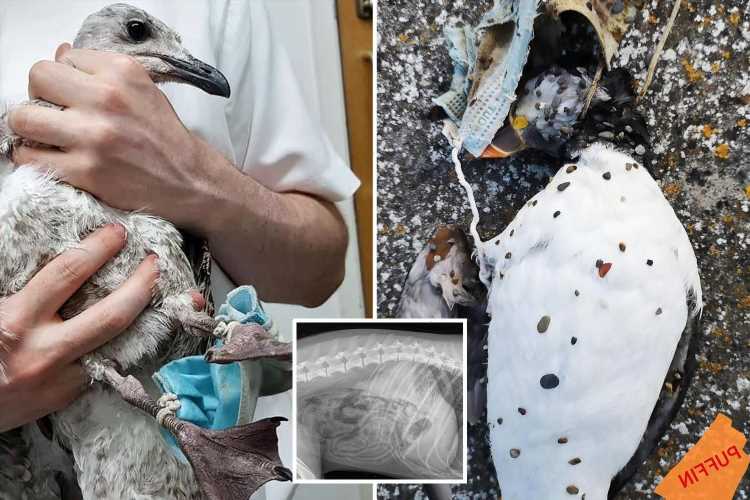TANGLED and slowly tightening around the ankles a single use mask slowly cuts off the blood supply to a bird’s feet.
After days struggling to move, hunt or scavenge, the seagull tries to run away from a human but falls flat on the pavement.
In the ocean a penguin spots what it thinks is a tasty snack weaving in and out of the waves, it catches and swallows whole.
Little does it know the blue object is a single use mask which will get lodged in it’s guts and slowly starve it to death.
Many animals killed or harmed will not be recorded
Elsewhere a seal chows down on what it thinks is a jellyfish, but instead it’s a plastic face covering which will sit in its stomach undigested and slowly starve it for days.
Back on land a dog doing it’s usual hoovering of anything edible on it’s walk accidentally snaffles up a mask and days later ends up having surgery to get it removed.
Leaving the good boy unable to play or go on walks for weeks.
This is the reality for animals across the globe as the blue PPE makes its way into our ecosystems.
Since masks became mandatory as a result of the coronavirus pandemic, 53 million a day are thrown away or dropped on our streets and cause problems for our animals.
The masks are affecting animals across the globe
At least 11 incidents have been reported in the UK, but the cases are likely to be far higher with many injured and dead animals not found.
Hedgehogs, birds of prey, crabs and many other animals have been injured or killed by the face coverings across the globe.
The RSPCA and RSPB are among charities calling for people to be more careful how they get rid of their masks after seeing the damage they do first hand.
RSPCA inspector Adam Jones who saved a seagull said that the bird could barely walk, falling over every few hops.
He said: “It’s clear the mask was there for some time and the elastic straps had tightened around his legs as his joints were swollen and sore.”
The young bird was later taken to the specialist team at South Essex Wildlife Hospital where staff managed to cut the mask off.
Recycling with The Sun's Mask Force will reduce masks ending up in nature
Adam added: “Thankfully, he’s been doing well and is being monitored closely. They’ve now released him out into an aviary with other gulls and, when the group is ready, they’ll all be released together.
“I’m concerned that this gull could be the first of many victims now that face masks are the norm.”
Thanks to The Sun’s Mask Force incidents like the above should be reduced as the masks can be dropped into specialist bins in Morrison’s across the country to be turned into outside benches, PPE and building materials.
The covered boxes should stop birds hopping in and attempting to take masks out to build their nest – which often sees them get stuck in the elastic straps.
Charities suggest cutting the straps of the masks before taking them to be recycled at one of our bins.
And it’s not just the in-tact masks that are causing a problem in our oceans.
When they eventually break down they form micro and nano plastics which are just as damaging.
The particles affect soil structure, which can cause fewer seeds to germinate and slow plant and crop growth.
And they have been discovered in wildlife from frogs to fish, woodlice to water fleas, and mice to mosquitoes — which have been found, on average, to contain 40 pieces of microplastic in their tiny guts.
Once inside our wildlife they cause damage to their internal organs, which can kill, and on top of that a third of plastics contain toxic chemicals which can affect reproduction and gender.
Source: Read Full Article










